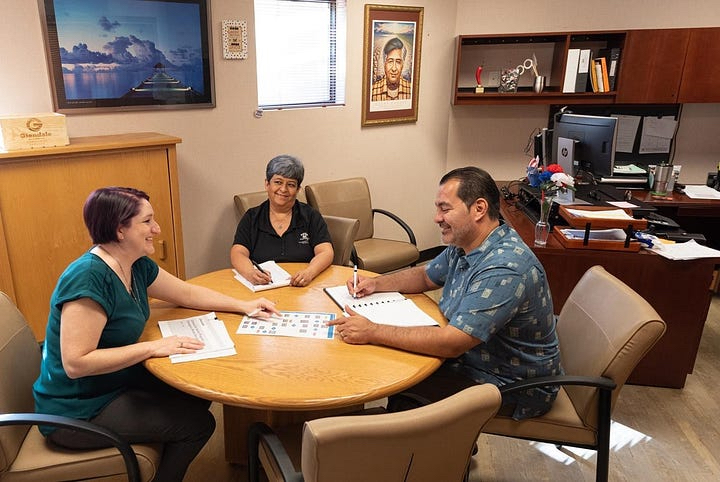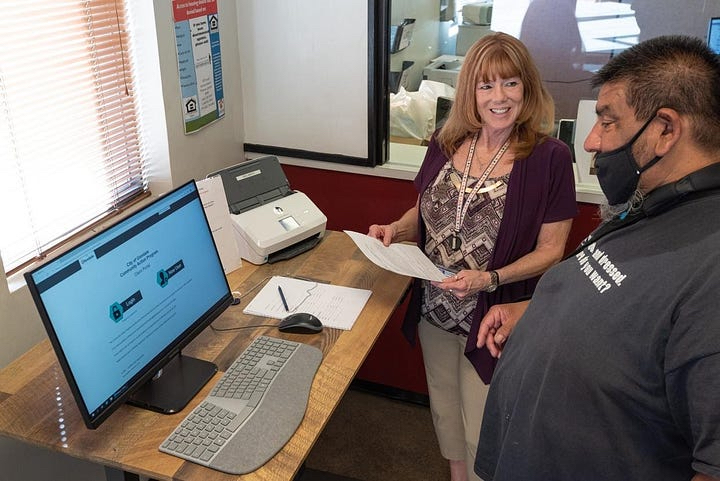Glendale, Arizona, USA
Using its Data Chops, Glendale Steps Up to Serve Residents During COVID-19 and Beyond.
Project Type:
Cross Sector, Health and Wellness, High-Performing Government, Technology
At a Glance
Implemented data-driven changes when transitioning its temporary emergency assistance program to electronic systems. This allowed the city to better support residents during the COVID-19 pandemic.
Analyzed call data in order to help prepare the program’s staff to handle incoming calls, shortening response times and increasing positive customer service feedback. The city tracked calling data in order to create a dedicated team designed to help residents.
Launched a centralized service request portal that streamlines customer service for the entire city and ensures a request is routed to the right resources.
Glendale’s Introduction to Data
The City of Glendale, Arizona, takes pride in being a place that offers something for everyone. Professional sports are definitely in the mix — the NFL’s Arizona Cardinals and NHL’s Arizona Coyotes make their home in the city, which is about nine miles northwest of downtown Phoenix. But there’s a vibrant civic and social fabric as well in this rapidly-growing, diverse city of about a quarter-million people, manifested in arts and culture, parks, and government services.
The City’s Community Action Program (CAP) has been part of this fabric for more than 20 years, providing targeted aid to residents experiencing a crisis. The program helps residents unable to pay their rent, mortgage, or utilities due to a temporary emergency such as job loss or unexpected medical expenses. “We address the immediate need, but also work with clients to identify potential interventions with community partners and wraparound services that can help prevent the crisis from occurring again,” says Director Jean Moreno of the Community Services Department (CSD), which contains CAP.
When COVID-19 hit, demand for assistance skyrocketed and CAP’s capacities were quickly strained. When the City closed its offices due to the pandemic, CAP’s manual workflows presented a challenge. “Our work had revolved around in-person appointments to collect eligibility documents and complete paperwork,” Moreno says.
Working with Business Intelligence and Analytics Officer Jenny Durda, who the City had hired in 2019 after its initial partnership with What Works Cities (WWC), Director Moreno and her team quickly implemented a wide range of data-driven changes to facilitate CSD’s transition to electronic systems and expand CAP’s ability to support residents during the pandemic. It’s an example of what’s now possible in Glendale due to the strong data culture and foundational practices the City has built up in recent years — Glendale has focused on open data, repurposing, and performance & analytics, and received technical assistance to implement results-driven contracting from Harvard Kennedy School’s Government Performance Lab, a WWC expert partner.

“Suddenly we had to develop electronic processes to deliver urgently needed aid to residents, so we embraced change, letting data lead the way forward.”
Building the Case for Change
Prior to the pandemic, residents had to call CSD to make an appointment and then apply for assistance in person. If they were missing any necessary documentation, they had to make an additional appointment to come back. The application process could stretch for weeks. Durda worked with the program administrator and key staff to revamp CAP’s call center process, starting with an analysis of call data. They discovered that even prior to COVID-19, the program was not staffed appropriately to handle all incoming calls because a performance review had never been done that would have provided data showing a clear resource deficit. With this information in hand, they worked across departments to source and train customer service representatives who had capacity to handle CAP calls.
Durda and Moreno then looked at individual performance data. They discovered that their top performer, in terms of quickly and accurately processing cases, was a long-time temporary employee. Using this performance data, Moreno was able to make the business case for transitioning the employee to full-time regular status. She was also able to address immediate staffing needs for CAP by training three library employees and a court employee who otherwise would have been unable to work during the pandemic.
“Digging into the data showed us why and how we needed to grow our capacity to meet residents’ needs during the crisis and beyond. The staffing changes enabled us to create a dedicated team that can better handle active CAP case management.”

Process improvements, such as retooling CAP’s workflow to separate intake work from casework, also delivered efficiencies. After Durda discovered CAP’s technology platform offered online application functionality, the entire process was digitized just six weeks after the city offices closed.
Within the first weekend of the CAP application portal going live, 70 new people applied for assistance without requiring an in-person visit. Prior to the pandemic, it would have taken CAP staff four days to complete 70 in-person eligibility appointments. With data showing that some residents may lack personal computers and at-home internet access, the City also installed computer kiosks in lobby areas that were publicly accessible to facilitate online applications, and offered preliminary intake by phone.
As residents’ needs were clearly heightened due to the COVID-19 pandemic, the City was able to meet demand by making staffing and process improvement changes that emerged from a data-driven culture years in the making. As a result, CAP disbursed about 9,500 payments to support utility and rent payments in only two quarters during the 2020–21 fiscal year, compared to about 2,000 the entire previous fiscal year. The program served more than twice as many households in the city during that fiscal year, pushing out around $10 million. That’s more than tenfold the average assistance provided to residents during the previous three fiscal years. Today, Glendale is one of a handful of jurisdictions in Arizona with an online rental and utility assistance application portal. The City is both sharing successes and gathering new ideas to support its data-driven governance efforts through the WWC regional network in Maricopa County.
“There’s no such thing as plagiarism in government. The collaboration between the different cities and the technical assistance we’ve received through What Works Cities has been instrumental in elevating our work.”
One City, One Portal
In Glendale, that work goes well beyond CSD. To improve service delivery and resident communications, and deliver on its commitment to be data-driven, last year the City launched a service request portal called GlendaleOne that streamlines customer service for the entire city. Residents can file requests for nonemergency services using the portal, which allows them to opt-in for real-time notifications via text, email, or automated phone calls as submissions are processed. The City paired the portal with a performance dashboard allowing residents to look up time estimates for fulfillment of each type of service request in an open dataset, and track the City’s overall performance.
The portal has dramatically improved how the City handles service requests. “Before GlendaleOne, people were tracking requests in spreadsheets, in emails, or even leaving sticky notes on desks for follow-up,” says Amy Handlong, executive assistant to Glendale’s city manager. “Now staff and residents can submit a request in GlendaleOne and it automatically routes to the right people.”
GlendaleOne has captured 27,700 resident issues since its launch, compared to about 16,000 total that the old system captured across 21 years of use. Resident response has been very positive, according to surveys conducted by the City Council. Next up for Glendale? Quarterly performance management meetings across all departments to help automate processes, improve the quality of metrics, and show the value creation of programs, says Khala Stanfield, director of the Organizational Performance Department. The mission of the department, founded with strong support from the City Council in 2019, is to lead the City’s data governance and open data efforts across departments, among other things.
“We’re supporting growing momentum in Glendale to place data and performance metrics at the center of things,” Stanfield says. “Staff have seen the impact of new approaches, in terms of level of services and building trust with the community. The pandemic has urged the need for change. We must continue to look for new processes and efficiencies going forward.”